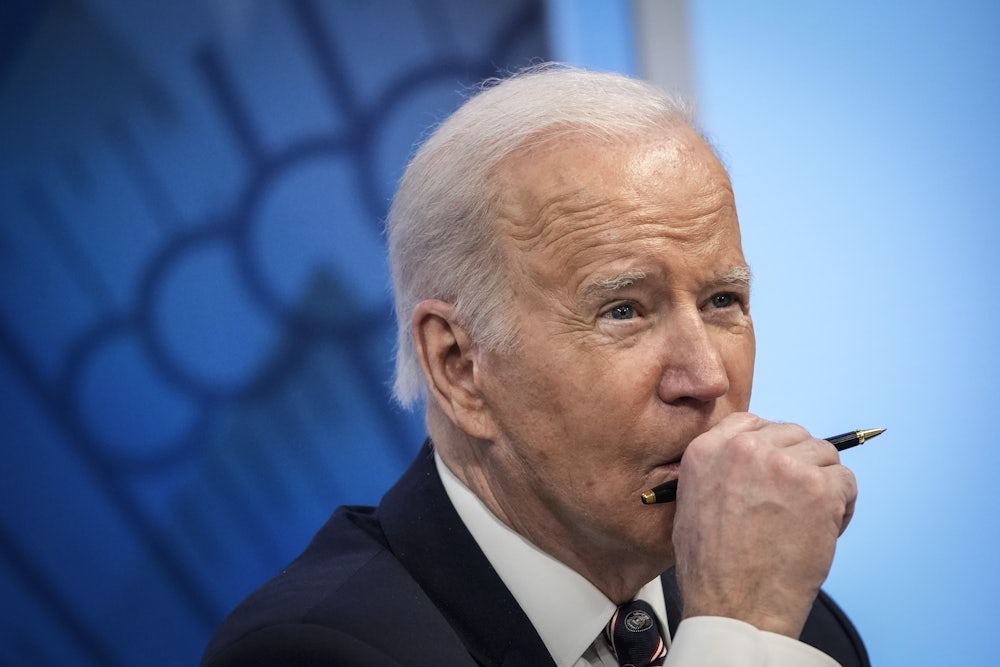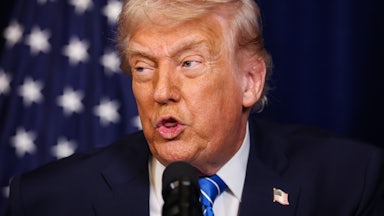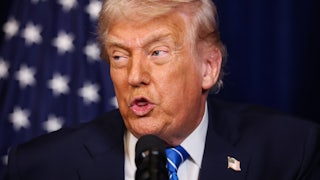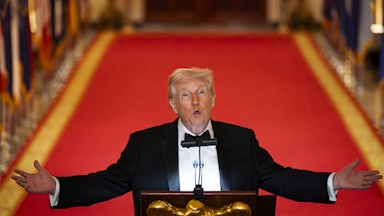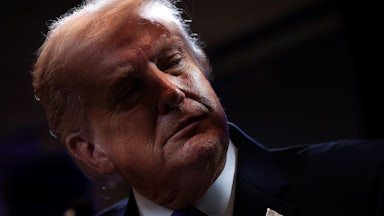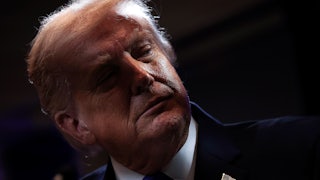A day before Russian President Vladimir Putin made the fateful decision to launch an invasion of Ukraine, the United States and its allies had already announced the imposition of a “first tranche” of harsh sanctions against Russia in the hopes of deterring an escalation in the ongoing conflict. With the threatened invasion now underway, further and more severe sanctions are likely to come. At the moment, however, these efforts will likely not include the levying of a harsh financial penalty that a Russian leader once likened to a “declaration of war.” Despite explicit requests from Ukraine, the U.S. and European allies have thus far not opted to cut Russia off from what is known as the SWIFT payment system, which is used the world over to facilitate banking transactions.
In remarks announcing a raft of sanctions targeting Russian financial institutions and elites with ties to Putin, as well as restricting some exports to Russia, President Joe Biden argued that the combined sanctions already on the table would be “more consequential” than excluding Russia from SWIFT. “The sanctions we imposed exceed SWIFT,” Biden said, adding that “right now it’s not the position that the rest of Europe wishes to take.”
The Society for Worldwide Interbank Financial Telecommunication, more commonly known as SWIFT, is a messaging system based in Belgium that links more than 11,000 financial institutions in over 200 countries and territories. The cooperative does not actually hold or transfer funds, but instead allows banks and financial firms to alert each other of impending transactions. SWIFT is overseen by the major central banks of Group of 10 countries, led by the National Bank of Belgium.
SWIFT recorded an average of 42 million messages per day in 2021. Russia accounted for 1.5 percent of transactions in 2020. Losing access to SWIFT would mean being cut off from most international financial transactions and would hamper Russia’s ability to obtain profits from oil and gas exports, which account for more than 40 percent of its revenue. When European allies mulled cutting Russia off from SWIFT in 2014, Russia’s then–finance minister guessed that it could cause the country’s gross domestic product to shrink by 5 percent. While Russia is heavily reliant on SWIFT, it has also taken steps to minimize the damage to its economy should it be excluded, by trying to shore up its own equivalent system, according to the Carnegie Moscow Center.
Nonetheless, cutting Russia off from SWIFT would make international transactions far more expensive and difficult, devastating its economy in the short term. But it could also negatively affect European economies, as Russia is the primary supplier of crude oil and natural gas to the European Union. Although leaders in the United Kingdom and some Baltic countries have called for Russia to be removed from SWIFT, other European allies have expressed reservations. EU leaders were expected to meet Thursday evening to discuss what forthcoming sanctions the bloc would offer, but German Chancellor Olaf Scholz told reporters that cutting Russia off from SWIFT should not be a part of that package.
“It is very important that we agree those measures that have been prepared—and keep everything else for a situation where it may be necessary to go beyond that,” Scholz told reporters, according to Reuters.
Although SWIFT is subject to Belgian and EU law, not American law, the U.S. could still act unilaterally to force its hand by threatening or imposing sanctions on SWIFT. Democrats unveiled legislation last month that would authorize sanctions on financial messaging services such as SWIFT, but Biden could also impose such sanctions without congressional approval or could put pressure on SWIFT by saying that it was violating U.S. sanctions against Russian banks. The U.S. previously persuaded SWIFT to kick out Iran in 2012. The Federal Reserve could also block Russia from accessing the U.S. dollar on its own.
Some experts argue that targeting its banks would have a greater impact than cutting Russia off from SWIFT. Even if it were excluded from SWIFT, Russia could still conduct transactions, albeit with more difficulty. “Simply preventing SWIFT from providing services to Russian banks would not have prevented those banks from continuing to transact with their US and EU counterparts in ongoing trade and settlements,” wrote Brian O’Toole, a former Treasury Department official and current nonresident senior fellow with the Atlantic Council, in a 2020 blog post. “To actually cut Russia off, a ban on the actual transactions, not the messages, with the jurisdiction would have been necessary.”
The U.S. is imposing sanctions on Russia’s banks holding a total of $1 trillion in assets, Biden said. These include Sberbank, its largest banking institution, which holds one-third of the nation’s assets, and VTB, which holds $250 billion in assets.
Still, some members of Congress have begun to call for Russia to be excluded from SWIFT. Representative Adam Schiff, the chair of the House Intelligence Committee, told reporters on Thursday that he supported such a dismemberment: “I favor expelling them from SWIFT. I favor imposing sanctions directly on Vladimir Putin,” Schiff later told MSNBC. (Biden has offered that the direct imposition of sanctions on Putin was an option he would consider.) Senator Richard Blumenthal said in a statement that the U.S. should “aggressively push our allies to deny Russia access to the SWIFT world financial system and target Putin and his corrupt oligarchs with sanctions on their personal assets.” Senate Minority Leader Mitch McConnell said that “every single available tough sanction should be employed and should be employed now,” although he did not mention SWIFT by name.
While Biden has not yet indicated he would be open to supporting Russia’s exclusion from SWIFT, Ukraine is continuing to press for it. “I will not be diplomatic on this. Everyone who now doubts whether Russia should be banned from SWIFT has to understand that the blood of innocent Ukrainian men, women, and children will be on their hands too. BAN RUSSIA FROM SWIFT,” Ukrainian Foreign Minister Dmytro Kuleba tweeted on Thursday.
